Columbia County News
Impact fees going
the way of the dodo bird.
Only Board Member Maxwell speaks up for the
district.
Columbia County, FL (posted March 5, 2009)
by Stew Lilker
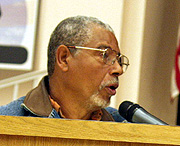
The debate ended when veteran Commissioner Ronald
Williams told the Boards, "As of Thursday night we’re
going to make sure we don’t take any more money in.
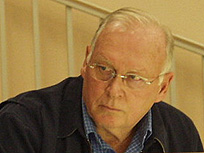 SB Member -- Charles Maxwell:
We rode that bubble like everybody
else, but we borrowed twenty-seven million dollars based
on that bubble ... What data do we have to support the
thesis that this is what’s causing construction to
diminish in this county?
SB Member -- Charles Maxwell:
We rode that bubble like everybody
else, but we borrowed twenty-seven million dollars based
on that bubble ... What data do we have to support the
thesis that this is what’s causing construction to
diminish in this county?
On February 1, 2008, after dragging its feet for seven years,
the Columbia County Commission finally passed an impact fee
ordinance. Impact fees are special taxes on new construction
designed to offset the cost of development on government
services. Finally, those impacting the school district and other
governmental services were going to pay their fair share.
On January 26, 2009, newly elected Superintendent of Schools,
Mike Millikin spoke before the Columbia County Legislative
delegation. He reported that the school district had lost over
seven million dollars in funding, which was a 10½ % reduction in
school revenues.
On Tuesday night, March 3, 2009, with the blood still flowing
in the streets and the school district on its knees, the good
old boys of the Columbia County Commission, buoyed by four of
the five members of the School Board, decided to eliminate
school impact fees. Only School Board member Charles Maxwell
spoke up for the district, its students and the working families
of Columbia County, opposing the impact fee moratorium. The
official moratorium vote is tonight.
Now -- In Their Own Words -- You are
there.
(Chairman Bailey opened the meeting and
explained)
Chairman Bailey: “We
felt it was only right that we had a discussion with the school
board.”
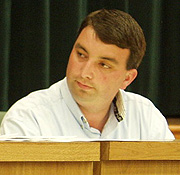 Chairman
Bailey then told the gathering of school officials and
contractors that the County Manager, Dale Williams, felt a
majority of folks were supporting the moratorium on impact fees.
Chairman
Bailey then told the gathering of school officials and
contractors that the County Manager, Dale Williams, felt a
majority of folks were supporting the moratorium on impact fees.
Before he opened for floor for discussion Chairman Bailey
said that it seems that the state is considering placing a
moratorium on impact fees.
(District I Commissioner Ronald Williams
took the floor)
Commissioner Williams:
We talked about impact fees as far back as eight years ago. We
started at the process of implementing impact fee during the
time that business was booming, in a sense, not only when
business was booming, but the fluctuation of people moving to
Columbia County was booming also...
People that would cause an impact on local
 government
had to provide. There should be a shared cost in that. It’s a
great tool to help with the things that we need to make Columbia
County better, but I also think that it’s time for us as a body
to look at where we are.
government
had to provide. There should be a shared cost in that. It’s a
great tool to help with the things that we need to make Columbia
County better, but I also think that it’s time for us as a body
to look at where we are.
If we do on Thursday night’s meeting implement a
moratorium then I would like to hold all the builders to our
word that, that will go away, the portion that the board levy.
And that will be not a discussion item with a plan that they are
building a house for.
... I have a problem with spec houses... I don’t know whether a person is
financially able to go out and build a bunch of spec houses to take advantage of
a three thousand dollar discount.
... If the legislature pass a three
year then it not board what we do anyway. We can supersede a
legislation this evening, but we can’t under succeed a
legislative agenda. That’s where I stand on it.
(District II Commissioner, Dewey Weaver,
was up next)
Commissioner Weaver:
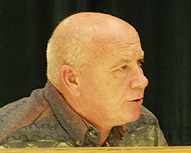 Construction is a large portion of the jobs that we have in the
community...
Construction is a large portion of the jobs that we have in the
community...
Do I believe that doing away with the impact fees,
we’re going to see a boom in the building over night? No, I
don’t. I don’t believe that at all. Will it help? Absolutely....
We should do what we can do to help our community regain its
footing in this economic market.
(Newly elected District III Commissioner,
Jody DuPree, gave his perspective.)
Commissioner DuPree:
I’m in the same business as most of the
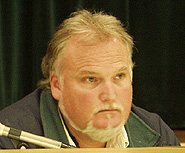 people
here. I can see the effects of the impact fee probably more than
most ... (Com. DuPree opined that impact fees make affordable
housing, unaffordable). You cannot build a house. 50% of the
problem is consumer confidence. Where it’s impacting this
community the worst is in the affordable housing market, which
is where we have a market, but we can’t build it.
people
here. I can see the effects of the impact fee probably more than
most ... (Com. DuPree opined that impact fees make affordable
housing, unaffordable). You cannot build a house. 50% of the
problem is consumer confidence. Where it’s impacting this
community the worst is in the affordable housing market, which
is where we have a market, but we can’t build it.
(It was the School Boards turn. School
Board President Glen Hunter led off.)
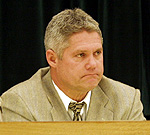 President
Glen Hunter: We got into the impact
fees, along with you, approximately a year ago, because of the
state funding requiring that school districts were having to
fund a little bit more ... I haven’t seen anyone that’s been
happy, that’s felt very good at all about the construction in
Columbia County.
President
Glen Hunter: We got into the impact
fees, along with you, approximately a year ago, because of the
state funding requiring that school districts were having to
fund a little bit more ... I haven’t seen anyone that’s been
happy, that’s felt very good at all about the construction in
Columbia County.
SB Member -- Steve Nelson:
 We need to do whatever we can do to help stimulate growth and
anything else we can do in our county. Impact fees are a very
small portion of what we bring in. If we had these years ago, we
wouldn’t be in the shape we are. Impact fees, as a concept, I
support. As far as what we need to do right now to help get
growth in our county, I support Mr. Williams. If we do away with
them now, we need to look at bringing them back when it’s
appropriate.
We need to do whatever we can do to help stimulate growth and
anything else we can do in our county. Impact fees are a very
small portion of what we bring in. If we had these years ago, we
wouldn’t be in the shape we are. Impact fees, as a concept, I
support. As far as what we need to do right now to help get
growth in our county, I support Mr. Williams. If we do away with
them now, we need to look at bringing them back when it’s
appropriate.
 SB
Member -- Charles Maxwell: We rode
that bubble like everybody else, but we borrowed twenty-seven
million dollars based on that bubble and we’re paying that off
and this money here is going to help in that regard... What data
do we have to support the thesis that this is what’s causing
construction to diminish in this county?
SB
Member -- Charles Maxwell: We rode
that bubble like everybody else, but we borrowed twenty-seven
million dollars based on that bubble and we’re paying that off
and this money here is going to help in that regard... What data
do we have to support the thesis that this is what’s causing
construction to diminish in this county?
Commissioner Williams:
I really don’t think we need data to back up what we’re saying.
Do I think that waiving the impact fee, that Columbia County
going to boom? No, I do not, but I do believe that there are
situations where a person might take that opportunity to build a
house by saving that three thousand dollars ... Statistics, I
doubt they would even add up, it’s more of a perception that
verify that fact.
Mr. Nelson: Explained that he
thought, “The impact fees were not what brought the number of
permit applications down.”
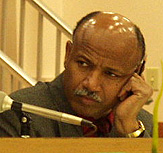 SB
Member – Linard Johnson:
(Mr. Johnson claimed that the three thousand dollar impact fee
is keeping folks from qualifying for loans). We’re going to have
to do something as leaders in this community so that people do
have the opportunity to purchase a home ... We all are going to
have to do something to contribute to getting the housing
industry back on its feet.
SB
Member – Linard Johnson:
(Mr. Johnson claimed that the three thousand dollar impact fee
is keeping folks from qualifying for loans). We’re going to have
to do something as leaders in this community so that people do
have the opportunity to purchase a home ... We all are going to
have to do something to contribute to getting the housing
industry back on its feet.
Commissioner Williams:
I personally would like to roll this back to January 1. To me
that’s a fair cutoff... If you done it in 2008, you have to eat
it.
(Outside Attorney from NGN)
Attorney Carrie:
[This] Needs to be done by ordinance. You need a ten day notice.
Mr. Maxwell:
I would like to insert one thing. This is the best named piece
of ordinance I’ve ever heard, it’s called impact. I just want
both boards to realize that it does in fact impact on the school
system ... Is there any lee way for reducing or changing, rather
than simply eliminating, because the impact itself is still
there. And that’s what we call an impact fee.
Commissioner Williams:
(Referring to the school impact fee) It’s up to you guys to say
to what extent you are going to eliminate all or part, and not
the boards.
Mr. Maxwell: I understood it was in fact the
total business of the county commission.
Commissioner Weaver:
We will make the final decision. We are the only ones with the
authority to implement it or put a moratorium on it ... We will
readdress it in January, 2010.
Mr. Johnson:
I think that if we are going to consider the moratorium, it is
considered from a date as of today or later. Going back and
trying to take out funding that is probably budgeted would be
cumbersome. I would recommend that you don’t make it
retroactive.
Commissioner Williams:
As of Thursday night we’re going to make sure we don’t take any
more money in.

